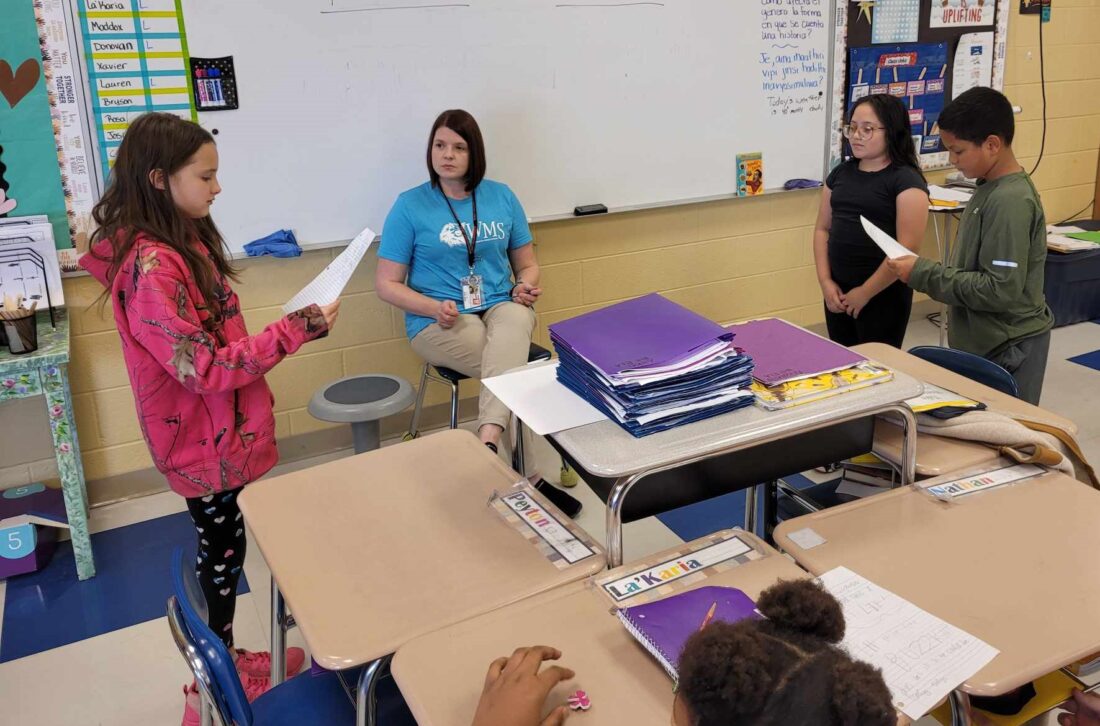
Hope Hill, Washington Middle School fifth grade teacher, is pictured “holding court” with Nevaeh Gray, Rosa Polanco and Bishop Goodlow. Holding court for fictional literature characters is a new and innovative way Hill has created to teach students.
Submitted photo
<!–
Washington Middle School’s Hope Hill, a fifth grade teacher, is throwing “the book” at the books.
Hill has found a new and creative way to not only teach her students and make learning a fun endeavor, but also help reinforce memory retention and reading comprehension.
Hill is placing the fictional characters her students read about on trial. She gives her students reading assignments then, as a fun way to help them retain what they’ve just read, breaks the classroom into two different groups – prosecutors and defense. Each group then must present evidence from what they’ve just read to convict or exonerate the main characters or protagonists in the story.
“It’s hard enough to just get them to read the assignments,” Hill said. “I had to think outside the box and find a way to get the kids engaged in the reading assignments; story court is what seems to work with this class. The kids are engaged, retaining the information better, and a byproduct is them using critical thinking skills.”
In the United States, 14% of the adult population cannot read.
“What’s more shocking is that we haven’t moved that needle in 10 years,” according to the National Children’s Book and Literacy Alliance’s website.
Low reading achievement does not equally impact all students. More than a third of Hispanic and African American 12th graders read below basic level. Many students who struggle to read and write make up a substantial portion of the 1.2 million students who leave high school each year without a diploma.
Hill, who just received a new English Language Arts (ELA) curriculum, is implementing the HMH Intro to Reading as part of her courtroom proceedings.
“The students just read the story inside the Intro to Reading book, called Airborne,” she said.
The question she posed to her prosecutors and defenders was if the grandfather in Airborne is telling the truth or making up a story about the creatures he’s claimed to have found and documented in his logbook? And beyond a doubt, her students are opinionated, depending on which side of the coin they’ve fallen on to his innocence or guilt.
“He is innocent, ” said Bishop Goodlow,” a student in Hill’s classroom. “Look, he documented in his logbook and has actually drawn pictures of what he’s seen.”
Goodlow then proceeded to enter into evidence the exact page and picture from the textbook he cited.
However, in direct contradiction of his position, Goodlow’s fellow classmate stated, “No, he’s making it up.”
“The animals and birds he’s claiming to have seen have never been identified by scientists,” said Nevaeh Gray, also a fifth grade student at Washington Middle School.
Gray, while not sourcing a direct text, used deductive reasoning and an educated guess to contradict the fictitious nature of the story, showing reading comprehension and understanding of the assignment.
The defense won the debate by a score of 6 to 3.
“The grandfather is free to go,” Hill said.
